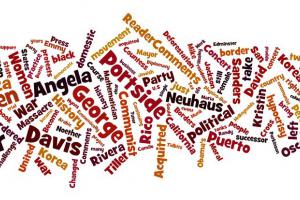The Rise of Computer-Aided Explanation
Quanta Magazine
 When people say they are “bad at math,” they usually mean that they had trouble with algebra, although if you corner them and ask the right questions you can usually make them realize that they use algebra all the time without noticing it. This leads to valid criticisms of how we teach math, but it doesn’t mean we’re a nation of math idiots.
When people say they are “bad at math,” they usually mean that they had trouble with algebra, although if you corner them and ask the right questions you can usually make them realize that they use algebra all the time without noticing it. This leads to valid criticisms of how we teach math, but it doesn’t mean we’re a nation of math idiots.
 Reader Comments: Kalief Browder and Criminality of Prisons; Fight for $15; Edward Snowden - Hero; Ronnie Gilbert; Walmart Anti-Labor Activity; Suicide in Young Women; The Audacity to Win - Left Strategy Needed; Recommended Books - By non-white authors;
Announcements: 62nd Memorial of the Execution of Julius and Ethel Rosenberg; Brooklyn Peace Fair
Reader Comments: Kalief Browder and Criminality of Prisons; Fight for $15; Edward Snowden - Hero; Ronnie Gilbert; Walmart Anti-Labor Activity; Suicide in Young Women; The Audacity to Win - Left Strategy Needed; Recommended Books - By non-white authors;
Announcements: 62nd Memorial of the Execution of Julius and Ethel Rosenberg; Brooklyn Peace Fair
 Reader Comments: Can Women End Korean War?; Countess vs. Communist-Battle to Become Madrid's Mayor; How the United States Strangled Puerto Rico; Obama's Human and Moral Challenge: Oscar López Rivera; The Press and Bernie Sanders; The Female Mathematician Who Changed the Course of Physics;
Appeal by Dr. Kristin Neuhaus, successor to Dr. George Tiller; Cross Borders Concert at the Gaza Strip border;
Today in History - Tiananmen Square Massacre; Angela Davis Acquitted
Reader Comments: Can Women End Korean War?; Countess vs. Communist-Battle to Become Madrid's Mayor; How the United States Strangled Puerto Rico; Obama's Human and Moral Challenge: Oscar López Rivera; The Press and Bernie Sanders; The Female Mathematician Who Changed the Course of Physics;
Appeal by Dr. Kristin Neuhaus, successor to Dr. George Tiller; Cross Borders Concert at the Gaza Strip border;
Today in History - Tiananmen Square Massacre; Angela Davis Acquitted
Warren Buffett has promised a cool billion dollars to anyone who gets all 63 matchups in the March Madness brackets right. Here's why he won't have to pay off.
 The art of origami has been going through a renaissance over the past 30 years, with new designs being created at ever-increasing levels of complexity. It’s no coincidence that this rise in origami complexity has emerged at the same time scientists, mathematicians and origami artists themselves have been discovering more and more of the mathematical rules that govern how paper folding works.
The art of origami has been going through a renaissance over the past 30 years, with new designs being created at ever-increasing levels of complexity. It’s no coincidence that this rise in origami complexity has emerged at the same time scientists, mathematicians and origami artists themselves have been discovering more and more of the mathematical rules that govern how paper folding works.
 Back in 2012, more North Carolinians voted for Democrats than Republicans in North Carolina’s Congressional elections. But Republicans ended up winning nine out of the state’s 13 seats that year. Those numbers piqued the interest of researchers at Duke, who decided to seek a mathematical explanation for the discrepancy. They recently published a study with their results.
Back in 2012, more North Carolinians voted for Democrats than Republicans in North Carolina’s Congressional elections. But Republicans ended up winning nine out of the state’s 13 seats that year. Those numbers piqued the interest of researchers at Duke, who decided to seek a mathematical explanation for the discrepancy. They recently published a study with their results.
Spread the word